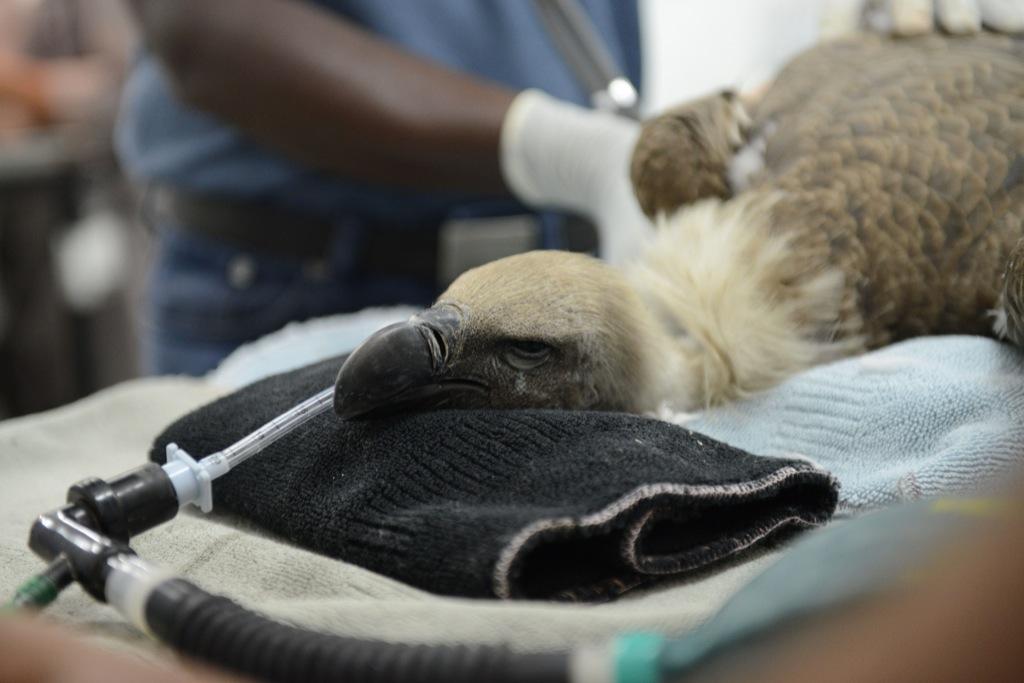Pakistan Inside/Out: A restaurant for vultures
Veterinary doctors treat an white-backed vulture, injured by a kite string, in India on Jan. 15, 2013. In Pakistan, vultures’ numbers have dwindled because of the chemical-laden carcasses on which they feed.
KARACHI, Pakistan — Cyrus Patel never thought he'd spend the majority of his professional life elbow-deep in dead animals. When he began studying veterinary medicine, he had visions of trudging through the African wilderness to treat endangered rhinoceroses.
"I got into animal medicine because I believed in wildlife conservation. I had always hoped to work with endangered species, I just never believed it'd be like this," Patel said by phone recently.
Three days of the week, Patel visits farms in rural Sindh province, where he examines the carcasses of dead livestock. He tests the animals to make sure they aren't diseased, or contaminated with pesticides or the chemicals often found in their food. Then, once he's sure the dead donkeys, cows and goats aren't dangerous to eat, he hauls them to Sindh's Nangar Parkar desert.
It's not the glamorous work he'd imagined, but Patel is nevertheless living out his dream of keeping endangered animals alive. Working with environmental agencies in Pakistan, including the World Wildlife Fund and the Peregrine Fund, Patel deposits the carcasses that he's deemed safe to a "vulture restaurant" — a protected area in Sindh where vultures can find large quantities of edible meat.
Sindh is home to two species of vulture — the white-backed and the long-billed — and for a few years in the early 2000s, no one was sure that either species would survive. Between 2003 and 2006, almost 50 percent of the region's vultures died, and wildlife experts were concerned that the decline would continue until the species were fully extinct.
Perhaps unsurprisingly, humans are behind the birds' rapid demise. A major threat to the vulture population has been the excessive use of diclofenac, an anti-inflammatory drug used by farmers in Pakistan to ease joint pain in livestock. Scientists have found that vultures who feed on carcasses with remnants of the drug in their systems develop visceral gout, a kidney disease, and die.
Vultures have major ecological significance in South Asia. They're what environmentalists have dubbed nature's most efficient recyclers, picking at the remains of dead livestock and speeding the decomposition process. That's a critical service to the species around them. "They limit the spread of diseases that can be spread by rotting corpses, and as a whole, keep the food chain intact," explained Patel.
Which is why their decline is so worrisome. Fewer vultures means more carcasses lying around, posing a greater risk to public health. With sanitation measures limited in Pakistan, roadkill and other dead stray animals — which could be carrying dangerous diseases like hepatitis — are often left to decay in the sunlight. Quick disposal of decaying meat is also important for limiting contamination of groundwater.
In the years since the carrion eatery opened in 2009, the vultures' numbers have slowly begun to creep up. According to one study, populations have now increased by as much as 52 percent.
Environmental groups successfully lobbied in 2006 for diclofenac to be banned, and are now partners with the government in their program to protect vultures. But implementation has been varied. In spite of improvements, traces of diclofenac are still found in livestock, according to Peregrine's testing.
Patel hopes one day to change that for good.
"It's still an uphill battle," Patel explained. "Along with the diclofenac, vultures are also losing large swaths of their habitats. [The vulture restaurant] is only a short term solution, and [though] it's effective, we have to play the long game."
Every day, reporters and producers at The World are hard at work bringing you human-centered news from across the globe. But we can’t do it without you. We need your support to ensure we can continue this work for another year.
Make a gift today, and you’ll help us unlock a matching gift of $67,000!
